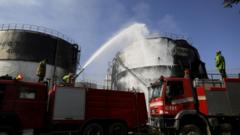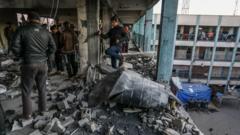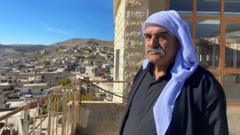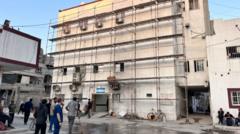In a recent airstrike conducted by Israel on Saturday, five Palestinians were reported dead in Khan Younis, raising significant controversy regarding the attack’s intentions and implications. The Israeli Defense Forces (IDF) confirmed that the strike aimed at an individual allegedly involved in the October 7 attacks but also struck a vehicle linked to World Central Kitchen (WCK), a charity organization providing humanitarian aid.
Five Lives Lost in Controversial Israeli Airstrike on Gaza

Five Lives Lost in Controversial Israeli Airstrike on Gaza
A targeted attack claims five lives, raising questions about civilian impact and target accuracy.
The IDF stated that the airstrike was targeted at a person who had supposedly participated in an attack on an Israeli kibbutz and had been under surveillance before the strike. They emphasized that the vehicle targeted was not marked as a humanitarian convey and its movement had not been coordinated for delivering aid. In response, WCK expressed deep sorrow over the loss of its employees, particularly noting that three of the deceased were part of their staff, including the Gaza kitchen director.
Witnesses and circulated images revealed the aftermath of the attack, depicting a charred vehicle associated with WCK operations. Despite the IDF’s claims about the individual’s terrorist affiliation, WCK responded by stating they were unaware of any ties between their employees and the October 7 attacks. The organization announced a pause in their operations in Gaza and requested a thorough investigation into the incident.
This incident is not isolated; it follows an earlier occurrence where several WCK staff members were killed in an unauthorized strike on an aid convoy, prompting outcry and operational pauses in response. The latest event not only illuminates the persistent violence within the region but also raises pressing questions regarding military accountability and the safety of civilians amidst conflict.
As civilian casualties continue to heighten, calls for clarification and investigation into targeting methods and parameters have become increasingly urgent, particularly from the international community and humanitarian organizations. This situation underscores the complexities surrounding military operations in densely populated areas and reflects the ongoing strife in the Israel-Gaza conflict, demanding critical reevaluation and dialogue.
However, while Israel maintains it acts in self-defense against identifiable threats, humanitarian agencies highlight the ramifications and ethical concerns tied to such actions, igniting scrutiny towards military practices in conflict zones.
Witnesses and circulated images revealed the aftermath of the attack, depicting a charred vehicle associated with WCK operations. Despite the IDF’s claims about the individual’s terrorist affiliation, WCK responded by stating they were unaware of any ties between their employees and the October 7 attacks. The organization announced a pause in their operations in Gaza and requested a thorough investigation into the incident.
This incident is not isolated; it follows an earlier occurrence where several WCK staff members were killed in an unauthorized strike on an aid convoy, prompting outcry and operational pauses in response. The latest event not only illuminates the persistent violence within the region but also raises pressing questions regarding military accountability and the safety of civilians amidst conflict.
As civilian casualties continue to heighten, calls for clarification and investigation into targeting methods and parameters have become increasingly urgent, particularly from the international community and humanitarian organizations. This situation underscores the complexities surrounding military operations in densely populated areas and reflects the ongoing strife in the Israel-Gaza conflict, demanding critical reevaluation and dialogue.
However, while Israel maintains it acts in self-defense against identifiable threats, humanitarian agencies highlight the ramifications and ethical concerns tied to such actions, igniting scrutiny towards military practices in conflict zones.


















